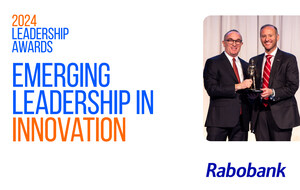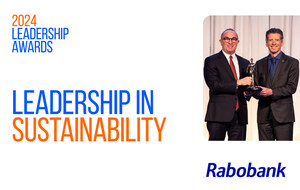China Will Continue To Drive Agricultural Commodity Demand For Next Decade, Rabobank Client Poll Finds
Leaders in North American Food & Agribusiness Look at Key Issues for 2013:
-- China's Impact on Agri Commodity Demand
-- China as Engine of Global Economic Growth
-- Concern over Weather Volatility
-- Increased Risk Management Practices
-- Corn Yield Forecasts
-- Impact of Social Media
-- Acceptance Factors for GMOs
NEW YORK, Dec. 18, 2012 /PRNewswire/ -- China's continued influence on agricultural commodity demand and global economic growth, along with increasing weather extremes, stand out as key issues for North American food, beverage and agribusiness in 2013, a recent poll of Rabobank clients shows.
The poll of over 350 executives from leading companies in the North American food, beverage and agribusiness industry was conducted at Rabobank's recent Markets Forum held in New York City. Rabobank is a leading bank to the global food and agribusiness industry and premier financial institution to the North American food, beverage and agriculture sector.
China Will Continue to Drive Demand for Agricultural Commodities
Asked to name the country or region which they believe will have the greatest impact on global agricultural commodity demand over the next 10 years, 61 percent of respondents at the Rabobank Forum chose China. That view of China's continued dominance far exceeded views of India (14 percent), Africa (10 percent), Latin America (9 percent), and Southeast Asia (6 percent).
Views Mixed on China's Long-Term Economic Dominance
Despite recent signs of slowing economic growth in China, the large majority of executives polled by Rabobank see China continuing to be the most important driver of long term global economic growth. Forty one percent of respondents said China would drive the global economy for between five and 10 more years, while 40 percent said China will remain the primary driver of global economic growth for the next 50 years.
Bill Cordingley, Head of Food & Agribusiness Research and Advisory for Rabobank in the Americas, said, "These results are not surprising and reflect the significant impact that China has had on the food and agribusiness industry over the past 10 years, globally as well as in North America. China today has the second largest middle class in the world at 157 million, which will surpass the U.S.'s middle class in the next ten years, so China's demand for agricultural commodities is going to continue to grow. Our North American clients in the food, beverage and agriculture sectors see opportunities to play a role in the Chinese market, not only as exporters but also as investors in the country's domestic growth by bringing technology, know-how and capital to support development of a more modern, safe food system in China."
In addition to their views on China, Rabobank Forum attendees provided opinions on a range of topics that they believe will be significant issues for the global and North American food and agriculture/agribusiness industry in the coming years, including production levels, risk management, genetically modified organisms (GMO), social media, and U.S. and European macroeconomics.
Continued Weather Extremes Will be Dominant Factor for North American Food & Agribusiness
Notably, 68 percent of attendees named weather extremes/volatility as the single biggest factor affecting North American food and agribusiness in 2013. That concern far outweighed the next two closest factors – consumer demand (13 percent) and policy/regulation (10 percent). Geopolitical events, trade/tariffs/exchange rates, and policy/regulation all received votes in the single digits.
"Given that the North American industry, particularly the U.S., is in the middle of the worst drought in over 50 years," said Cordingley, "these views are quite understandable and represent a significant issue that is top of mind for most food industry players as we enter 2013."
Agribusiness Increasing Risk Management In Response to Volatility
Reflecting the concern over continued weather volatility, 59 percent of respondents said that 2012 drought has changed their views about risk management in their business. Executives at the Rabobank Forum cited an increased focus on financial liquidity (25 percent), increased investment in risk management and insurance (21 percent), and greater diversification (13 percent) as their three leading solutions to hedge against continued volatility in weather patterns and commodity markets.
66% Expect U.S. Corn Yield to Exceed 200 Bushels/Acre by 2025
"Corn is a critical input to the North American food industry, and strong and consistent yield growth has underpinned the industry in the U.S. for the past ten years. Despite the enormous gains already made due to precision farming, GMOs, and other technologies, attendees at the Forum were very bullish in terms of their outlook for this trend to continue longer term," said Cordingley.
Over ninety percent of executives at the Rabobank Forum said that they expect U.S. corn yields to exceed 170 bushels per acre by 2025: notably, over a quarter (26 percent) forecast yields of over 250 Bu/a, while forty percent forecast yields of between 200 Bu/a and 250 Bu/a. Those expectations compare to U.S. trend line yields of between 150-160 Bu/a in recent years, prior to this year's drought-driven decline to 120 Bu/a.
Impact of Social Media on Food & Agribusiness Sector
Social media played a significant role in the news earlier this year about the use of lean finely textured beef (LFTB) in U.S. beef processing. Rabobank asked its Forum attendees if the rise of social media is causing them to adopt a different approach in their business. More than half of executives (51 percent) said that the growing influence of social media is changing the way they handle brand and reputation management and business communications. Nine percent said it is driving changes in the way they handle vendor/customer/supply chain management. However, 37 percent said they are not making business changes in response to the increasing prominence of social media.
"Social media has introduced a new and widely accessible communications platform to the media mix, and this has created both opportunities and risks for companies in the food industry. For some parts of the industry, 'business as usual' may not work any longer as social media exercises its potential to be a catalyst for change. However, the social media phenomenon also offers the industry an opportunity to engage in direct discussions with consumers and other stakeholders, to address concerns, to educate, and to clarify fact from rumor or misinformation. One thing is certain, social media is changing the food business in North America."
What Factor Will Most Influence Acceptance of GMOs?
While well-established in the U.S. market, GMOs in agriculture remain controversial in many parts of the world and have not had anywhere near the rates of option outside the U.S. Polled on the factors that would most encourage increased global uptake of GMO technology in agriculture over the next decade, 56% of respondents cited sustained high commodity prices. Others said that greater consumer acceptance (34 percent) will be key to higher adoption, but 7 percent said they believe GMO uptake will slow. Three percent said that improved intellectual property rights in developing markets will be the solution to make GMOs more acceptable among consumers and the food industry.
About the Rabobank Annual Markets Forum
The Rabobank Markets Forum is an annual event hosted by Rabobank International in North America that brings together hundreds of executives and senior managers from the bank's clients – the leading companies in the North American food, beverage and agribusiness industry – as well as Rabobank analysts and bankers, and financial market opinion leaders for an interactive discussion about strategic issues shaping the global and domestic business environments. A key element of every Rabobank Markets Forum is audience polling to gauge the opinions of food and agribusiness industry leaders on a variety of topics relating to financial, economic, agricultural, and commercial markets.
This year's speakers included Luke Chandler, Global Head of Agri Commodity Markets Research for Rabobank; Jan Lambregts, Global Head of Financial Markets Research for Rabobank; and Dr. Nouriel Roubini, Chairman of Roubini Global Economics, as keynote speaker.
Rabobank Group is a global financial services leader providing wholesale and retail banking, asset management, leasing, real estate services, and renewable energy project financing. Founded over a century ago, Rabobank is one of the largest banks in the world, with nearly $1 trillion in assets and operations in more than 40 countries. In North America, Rabobank is a premier bank to the food, beverage and agribusiness industry. Rabobank's Food & Agribusiness Research and Advisory team is comprised of more than 80 analysts around the world who provide expert analysis, insight and counsel to Rabobank clients about trends, issues and developments in all sectors of agriculture. www.Rabobank.com
SOURCE Rabobank
WANT YOUR COMPANY'S NEWS FEATURED ON PRNEWSWIRE.COM?
Newsrooms &
Influencers
Digital Media
Outlets
Journalists
Opted In





Share this article